Do Germ-Zapping Gadgets Really Work?
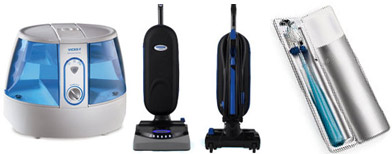
Learn the truth about products that boast bacteria-killing properties
MORE FROM WOMAN'S DAY
You already wash your hands frequently (and take drastic measures to avoid that coughing coworker across the hall), but should you spend your hard-earned money on one of the many new products that promise to limit your exposure to harmful germs? We rounded up the most popular and interesting germ-fighting gadgets and remedies, and asked two internationally known experts to give us the scoop. Are they worth buying or just a waste of money? Keep reading to find out.
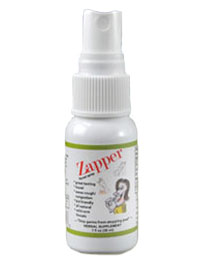
1. Germ-Zapping Throat Spray
What is it? Certain products, such as the Zapper Throat Spray ($9.95; ZapperThroatSpray.com), promise to boost your immune system and protect you from germs that can make you sick. Zapper, which is sprayed into the throat, contains a mix of herbs such as peppermint and ginger, along with a compound called colloidal silver, which is believed to have antimicrobial properties.
Should you buy it? Probably not, says Philip Tierno, PhD, director of clinical microbiology and immunology at New York University Langone Medical Center, and the author of The Secret Life of Germs. While he doesn't doubt the health benefits of some of the herbs in this product, he says not to count on it to ward off potential infections. "Germs in the throat are only part of the equation," he says, noting that the eyes and nose are other ports of entry for pathogens. "I wouldn't buy it," Dr. Tierno adds.
Photo courtesy of ZapperThroatSpray.com.

2. Germ-Free Humidifier
What is it? These type of humidifiers, such as the Vicks Germ Free Humidifier ($99; Kaz.com), reportedly kill 99.9 percent of germs using an ultraviolet light chamber to purify the water in the tank before it is released into the air.
Should you buy it? Yes. According to Dr. Tierno, humidifiers are often a breeding ground for bacteria because people forget to clean them-plus, many models are difficult to disinfect effectively. What's the problem with germ buildup in a humidifier? Potentially harmful pathogens are released into the air. "In humidifiers you have an agent called Legionella pneumophilia, which can cause disease," he explains. "I actually tested this product," says Dr. Tierno, "and it does work."
Photo courtesy of Kaz.com.
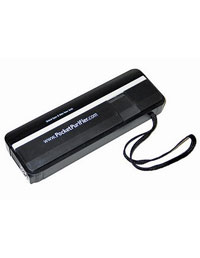
3. Germ-Eliminating Light
What is it? Imagine being able to wave a small, hand-held light over a germy surface (think: restaurant table, airplane tray table, elevator buttons) and-voilà-instant germ eradication. That's the idea behind products like the Pocket Purifier ($29.95; PurelyProducts.com), which uses UV light to supposedly tackle germs. The product's makers say it eliminates 99.9 percent of germs with a 10-second flash of light.
Should you buy it? No. "To my mind, this is useless," says Dr. Tierno. "You cannot get proper coverage or contact time to provide any kind of meaningful effect." Donna Duberg, MA, a germ expert and assistant professor of clinical laboratory science at Saint Louis University, recommends using "disinfecting wipes that kill 99.9 percent of bacteria and viruses," instead.
Photo courtesy of PurelyProducts.com.
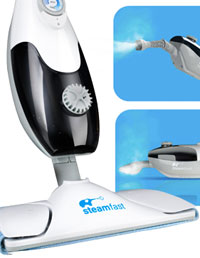
4. Germ-Killing Floor Steamer
What is it? First came the mop, next came the Swiffer, and now floor steam cleaners, like The Best Floor Steam Cleaner from Hammacher Schlemmer ($99.95; Hammacher.com), are all the rage. This one heats water to 220°F, reportedly killing bacteria, viruses and mold in the process.
Should you buy it? Yes. While it's quite a bit pricier than a mop, the germ-killing effects of this product are legitimate, says Dr. Tierno. "Anything 212 degrees and above kills microorganisms," he explains. But, for proper germ elimination, cleaning may take a while. You'll need to hold the steamer over the floor for at least 10 seconds (think of the spot under the toilet in the bathroom) to do the job, adds Dr. Tierno. Already have a floor steamer, and curious as to whether it's effective? Simply set a thermometer under the steam (being careful not to burn yourself). If the temperature registers more than 212 degrees, it's an effective product. And, better avoid your sealed hardwood floors with these products-they may cause damage.
Photo courtesy of Hammacher.com.
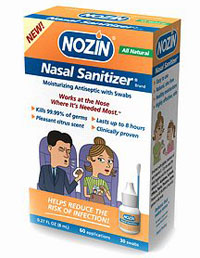
5. Nasal Sanitizer
What is it? NOZIN ($14.99; NOZIN.com) is a nose-sanitizing gel that's applied with a cotton swab inside the nostrils before entering a high-germ environment, such as an airplane. It's said to be made from a "proprietary formula," with ingredients ranging from ethyl alcohol to jojoba, and the product's makers say it can help you reduce the risk of infection.
Should you buy it? Probably not. "I don't think this is really very effective," says Dr. Tierno. "You may kill some germs, but you will not eradicate them. And, organisms can bypass this system. You can breathe in cold viruses." Also, he and Duberg both have concerns about the product's alcohol content. "This could conceivably disrupt normal respiratory flora in your mucous membranes, which are there to protect you in the first place," says Duberg.
Photo courtesy of NOZIN.com.
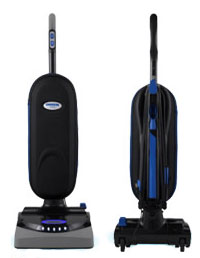
6. Germ-Eliminating Vacuum Cleaner
What is it? Fitted with a special UV-C light, Oreck's Halo line of germ-killing vacuums and attachments (starting at $199.95; Oreck.com) are said to blast germs, viruses, dust mites and flea eggs in just one pass, without any steam or chemicals.
Should you buy it? Probably not. Duberg questions whether these types of vacuums can really de-germ your carpet. In her clinical laboratory, a UV light is used to disinfect countertops. But to do the job, she says, the light has to be in place for at least 30 minutes. "You may kill some germs on the surface with a vacuum like this," adds Dr. Tierno, "but not in the core of the fibers."
Photo courtesy of Oreck.com.
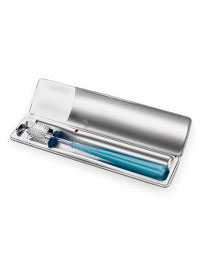
7. Toothbrush Sanitizer
What is it? The latest craze in germ-busting is sanitizing toothbrushes. Products like The Million Germ Eliminating Travel Toothbrush Sanitizer from VIOlight ($29.95; Hammacher.com) reportedly use UV technology to eliminate up to 99 percent of the "millions of germs" that can accumulate on toothbrushes, including Streptococcus and Listeria.
Should you buy it? Maybe, but only if you're interested in recreational germ zapping. While both Duberg and Dr. Tierno don't doubt the effectiveness of a product like this, they both question the need for it. "My question is why?" says Dr. Tierno. "You shouldn't be sharing toothbrushes, and you're unlikely to infect yourself from your own toothbrush." If you're worried about keeping your toothbrush clean, save your money and do this: Always let it air-dry (germs hate to be dried out), send it for a bath in germ-zapping peroxide from time to time and buy a new brush every month or so. Bottom line: No need to bring out the big germ-killing guns on something that's unlikely to be harmful to you in the first place.
Photo courtesy of Hammacher.com.
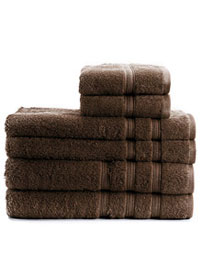
8. Antimicrobial Towel
What is it? Even fabric is getting a germ-fighting makeover. You can now buy towels, like the line of antimicrobial bath towels from Walmart ($30 for a 6-piece set; Walmart.com) that promise greater germ protection thanks to a proprietary Microban that is said to resist bacterial growth and odor.
Should you buy it? Maybe. "These may be useful," says Dr. Tierno. But he's not rushing out to buy them. If you really want to rid your towel of bacteria, just let it air-dry and launder often, he says. Duberg has concerns about the lasting power of the Microban properties in such towels. "It's not clear how long it lasts, or through how many washings," she says.
Photo courtesy of Walmart.com.
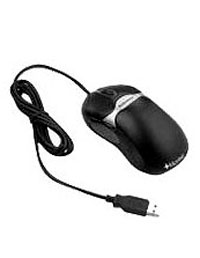
9. Antimicrobial Computer Mouse
What is it? Researchers have long believed that the humble office desk is a germ breeding ground (just think: you sit there for hours a day, eating, perspiring, meeting with people, yet when was the last time you disinfected your workspace?), and some product makers are hoping to fill a need. The Fellowes 98913 Antimicrobial 5-Button Programmable Mouse ($38.99, Amazon.com), for instance, contains a Microban, which is thought to prevent germs from multiplying.
Should you buy it? Probably not. While products like these could give you some protection, it's unlikely to be as effective as a weekly office wipe-down with disinfecting wipes, says Duberg. "It could also give people a false sense of security, making them think that they don't need to wash their hands as often, when they really do," she adds.
Photo courtesy of Amazon.com
http://health.yahoo.com/featured/107/do-germ-zapping-gadgets-really-work/

Thanks for sharing, I will bookmark and be back again
BalasHapusBuy Gadgets